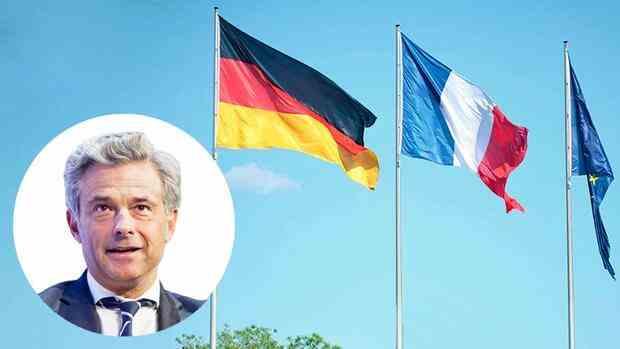Philippe Oddo is managing partner and CEO of the German-French private bank ODDO BHF Group.
January 22 marks the 60th anniversary of the signing of the Franco-German friendship treaty. With the Élysée Treaty, Konrad Adenauer and Charles de Gaulle also paved the way for the European integration process, building on the Montanunion and the Treaties of Rome.
The courage to want to put an end to the national resentment that had been nurtured and exploited for generations and the foresight were rewarded. The current geopolitical challenges also require a new era in Franco-German relations.
Today there is war again in Europe. Right now we should take courage and deepen the friendship again. Certainly, relations between Paris and Berlin have been more cordial in the past. But, and one should not forget this, they were always shaped by different interests. It is important to bring these motives into maximum harmony.
Without a common Franco-German position, Europe cannot create any reforms
Because the defense of peace in Europe, the security of the energy supply, the reorganization of the supply chains, the ecological transformation and the achievement of an economic balance between Europe, the USA, China and the emerging markets require not only friendship but also clear articulation on both sides of the Rhine common interests and solidarity in their implementation.
Top jobs of the day
Find the best jobs now and
be notified by email.
Common answers and a clear framework are also desired in the economy of both countries. Against the background of global challenges, this was clearly addressed at our bank’s annual kick-off forum with hundreds of entrepreneurs, managers and opinion leaders from Germany and France as well as international investors.
>> Read here: France wants to revolutionize Europe’s industrial policy
Recently, we read in Germany that instead of the rhetoric of friendship, what is needed above all is more honesty in dealings: less romanticism, more realism; less past, more future. I think the key to Franco-German cooperation lies above all in “more future”. Friends like to look back, but friendship only grows through new joint ventures.
The themes for this are obvious. We need European solutions in climate policy, in energy supply, in the regulation of digital communication and in foreign, security and defense policy.
And we need a capital market and banking union so that Europe can hold its own in international competition and remain attractive to investors – especially with a view to financing the important transformation issues. Without joint Franco-German positions in all these areas, no European solution can be achieved.
And without strong European positions, Europe will continue to fall behind in the competition with the USA and China and will fail as an attractive alternative. Future generations will judge us by it.
Germany’s and France’s strengths complement each other
Germany and France must move forward together on these important issues of our time and be prepared to assume even more leadership responsibility in and for Europe. And the two countries can do it. So far, Europe has emerged stronger from every crisis.
The key to success lies in Europe’s diversity and the complementarity of Germany’s and France’s strengths. I experience this very concretely, as I have been working in Germany from Tuesday to Thursday and in France the rest of the week for more than five years. The intensive exchange of ideas and their realization – regardless of whether it starts with the more flexible “concept” that is usual in France or the “concept” that has been worked out in detail – is inspiring, fruitful and critical to success.
It is a good sign that the planned ceremony for the anniversary will also give special attention to “young Franco-German talents”. After all, the word talent – despite the different pronunciation – has the same meaning in both idioms: one that implies future potential.
Regardless of whether it is the transformation to a climate-neutral economy, European security, innovation and digitization or intergenerational justice – the young generation in Germany and France has an enormous will to shape things. The future can only be shaped with those who still have it ahead of them.
Additional offers for a more intensive exchange of young people from both countries can also play a greater role, for example in the form of a European citizen service or an Erasmus program for young workers.
In our youth I see the desire and the will to network with like-minded people and to experience and renew friendship. We should seize this opportunity to actively shape a new era together from the heart of Europe.
The author:
Philippe Oddo is managing partner and CEO of the German-French private bank ODDO BHF Group.
More: Macron warns the federal government against isolation
